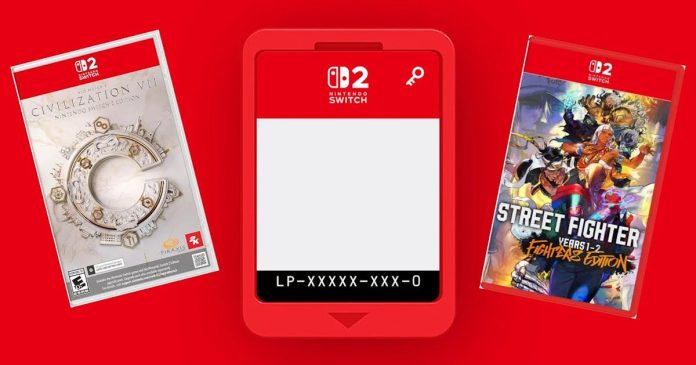There’s a pretty loud elephant in the room when it comes to the Switch 2’s software: its strange, anti-consumer approach to selling games in brick and mortar stores. However, it seems that Nintendo wants to better understand how customers are getting on with its controversial new approach to physical games, as evidenced by a survey sent to its loyal customers.
While the majority of Switch 2 games can be purchased physically in stores, the old-fashioned way, not all of those physical games are created equal. Some developers, like CD Projekt Red went out of their way to put the entirety of their game on a physical game cart. But others have opted to ship games on “Game-Key Cards.” Despite being purchased in a physical box with a cartridge inside, games shipped with so-called Game-Key Cards must be downloaded as a digital copy and can only be played when the cartridge is inserted into the system. These carts contain little to no actual game data. It’s essentially an elaborate and inconvenient approach to DRM.
This week, Switch 2 players in Japan have begun receiving a questionnaire asking their thoughts on Game-Key Cards, a sign that Nintendo isn’t exactly sure what customers make of their strange and ultimately useless alternative to downloading the game from the eShop. Questions on the survey include whether these players are aware of what a Game-Key Card is, what they know about them, and whether they’d buy the Game Key Card over a straight-up download of the same game.
Some Switch 2 launch games, like Bravely Default and Street Fighter 6, are shipped as Game-Key Cards.
RICCARDO MILANI/AFP/Getty Images
Nintendo’s Game-Key Cards have already stirred plenty of criticism from gaming preservationists online. Selling a physical cartridge to gamers that doesn’t contain the game is problematic for consumers as is, as deleting the software from their console means having to re-download the game again if they want to play it again later. But it also ensures these games will be gone forever if they’re ever removed from the eShop. As we’ve seen with the 3DS and Wii stores before, the far-off but inevitable day when Nintendo shuts down the eShop for good also spells doom for these games.
While the survey doesn’t guarantee Game-Key Cards are going anywhere anytime soon, it does suggest that there’s enough skepticism (either from customers, developers, or from Nintendo itself), around them to warrant a bit of research on how they’re perceived on the market. This is a fairly new concept being introduced to Nintendo’s ecosystem.
To be fair to Nintendo, its competitors have been doing the same for years. Tons of physical games on PlayStation 5 and Xbox Series consoles ship in boxes containing empty Blu-Rays that do nothing but activate a download of the game. It’s one of the worst trends to hit modern gaming, as physical games are a waste of plastic that don’t guarantee the customer who purchases them anything but a license to play something.
This month, Nintendo has been pretty open about how closely it’s monitoring player reception to its new console. In a shareholder Q&A last week, the company said that it would be keeping an eye on how the console’s $450 price tag impacts younger demographics who love Nintendo’s pantheon of colorful characters and worlds. During that same Q&A, Nintendo President Shuntaro Furukawa said the Game-Key Card was introduced to “accommodate the larger game data sizes” of newer games.
He suggested that shipping games on this format is a choice ultimately made by the publisher. I’m sure Nintendo is happy to support whatever publishers want to do, I can’t imagine that customer feedback wouldn’t have some say impact on its approach to physical games. If enough players feel strongly about buying an empty game card, maybe this experiment will change for the better.
Despite the Game-Key Card controversy, the Switch 2 has been a major success for Nintendo. The console sold 3.5 million units in its first four days, making it the fastest-selling of all time in the company’s history. It seems extremely likely that the number will continue to climb as upcoming exclusives like Donkey Kong Bananza and Metroid Prime 4 release in the months to come.
